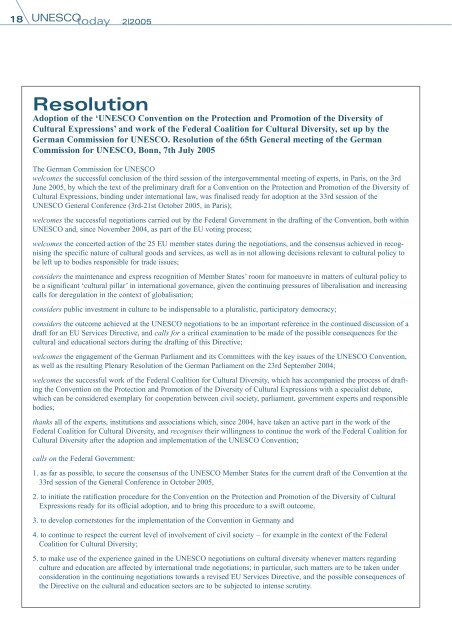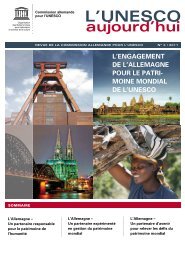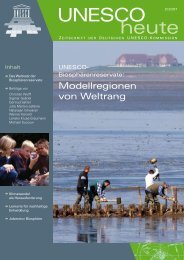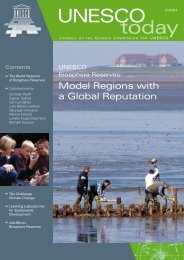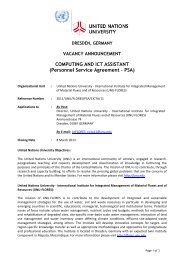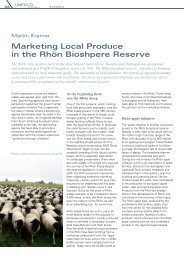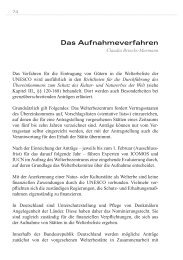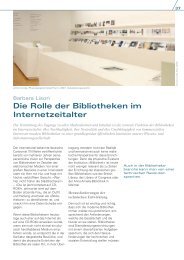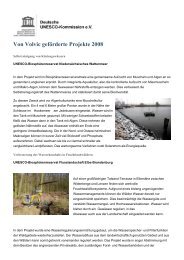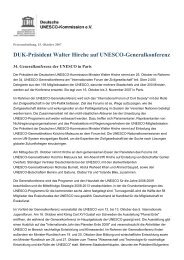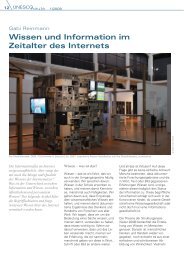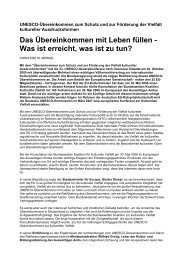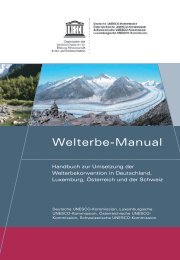Download - UNESCO Deutschland
Download - UNESCO Deutschland
Download - UNESCO Deutschland
Create successful ePaper yourself
Turn your PDF publications into a flip-book with our unique Google optimized e-Paper software.
18 <strong>UNESCO</strong>today 2|2005<br />
Resolution<br />
Adoption of the ‘<strong>UNESCO</strong> Convention on the Protection and Promotion of the Diversity of<br />
Cultural Expressions’ and work of the Federal Coalition for Cultural Diversity, set up by the<br />
German Commission for <strong>UNESCO</strong>. Resolution of the 65th General meeting of the German<br />
Commission for <strong>UNESCO</strong>, Bonn, 7th July 2005<br />
The German Commission for <strong>UNESCO</strong><br />
welcomes the successful conclusion of the third session of the intergovernmental meeting of experts, in Paris, on the 3rd<br />
June 2005, by which the text of the preliminary draft for a Convention on the Protection and Promotion of the Diversity of<br />
Cultural Expressions, binding under international law, was finalised ready for adoption at the 33rd session of the<br />
<strong>UNESCO</strong> General Conference (3rd-21st October 2005, in Paris);<br />
welcomes the successful negotiations carried out by the Federal Government in the drafting of the Convention, both within<br />
<strong>UNESCO</strong> and, since November 2004, as part of the EU voting process;<br />
welcomes the concerted action of the 25 EU member states during the negotiations, and the consensus achieved in recognising<br />
the specific nature of cultural goods and services, as well as in not allowing decisions relevant to cultural policy to<br />
be left up to bodies responsible for trade issues;<br />
considers the maintenance and express recognition of Member States’ room for manoeuvre in matters of cultural policy to<br />
be a significant ‘cultural pillar’ in international governance, given the continuing pressures of liberalisation and increasing<br />
calls for deregulation in the context of globalisation;<br />
considers public investment in culture to be indispensable to a pluralistic, participatory democracy;<br />
considers the outcome achieved at the <strong>UNESCO</strong> negotiations to be an important reference in the continued discussion of a<br />
draft for an EU Services Directive, and calls for a critical examination to be made of the possible consequences for the<br />
cultural and educational sectors during the drafting of this Directive;<br />
welcomes the engagement of the German Parliament and its Committees with the key issues of the <strong>UNESCO</strong> Convention,<br />
as well as the resulting Plenary Resolution of the German Parliament on the 23rd September 2004;<br />
welcomes the successful work of the Federal Coalition for Cultural Diversity, which has accompanied the process of drafting<br />
the Convention on the Protection and Promotion of the Diversity of Cultural Expressions with a specialist debate,<br />
which can be considered exemplary for cooperation between civil society, parliament, government experts and responsible<br />
bodies;<br />
thanks all of the experts, institutions and associations which, since 2004, have taken an active part in the work of the<br />
Federal Coalition for Cultural Diversity, and recognises their willingness to continue the work of the Federal Coalition for<br />
Cultural Diversity after the adoption and implementation of the <strong>UNESCO</strong> Convention;<br />
calls on the Federal Government:<br />
1. as far as possible, to secure the consensus of the <strong>UNESCO</strong> Member States for the current draft of the Convention at the<br />
33rd session of the General Conference in October 2005,<br />
2. to initiate the ratification procedure for the Convention on the Protection and Promotion of the Diversity of Cultural<br />
Expressions ready for its official adoption, and to bring this procedure to a swift outcome,<br />
3. to develop cornerstones for the implementation of the Convention in Germany and<br />
4. to continue to respect the current level of involvement of civil society – for example in the context of the Federal<br />
Coalition for Cultural Diversity;<br />
5. to make use of the experience gained in the <strong>UNESCO</strong> negotiations on cultural diversity whenever matters regarding<br />
culture and education are affected by international trade negotiations; in particular, such matters are to be taken under<br />
consideration in the continuing negotiations towards a revised EU Services Directive, and the possible consequences of<br />
the Directive on the cultural and education sectors are to be subjected to intense scrutiny.


